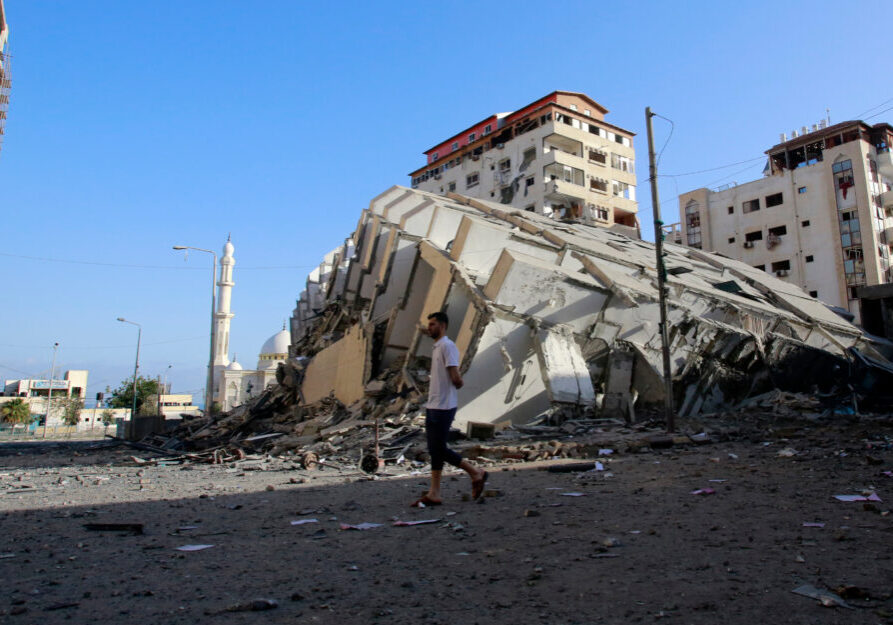Australia/Israel Review
The Unilateral Fallacy
Nov 24, 2009 | Alan Baker
By Alan Baker
The scene is currently being set by the Palestinians for a strong and even dramatic point of entry into either bilateral negotiations or perhaps a sharp diplomatic turn toward a unilateral strategy for Palestinian statehood. Recent dramatic statements by Palestinian Chairman Mahmoud Abbas, evidently aimed chiefly at the US administration, declaring his intention not to seek re-election in light of the lack of progress in the negotiation process, are one indication.
Add to this a statement made by the head of the Palestinian Negotiation Department Saeb Erekat to the Palestinian newspaper al-Ayyam on Nov. 14 confirming recent discussions and expressions of support from UN Secretary General Ban Ki-moon and the EU’s top diplomat Javier Solana for a Security Council resolution acknowledging a Palestinian state along the 1967 lines with its capital in East Jerusalem. Senior PA Central Committee member Muhammed Dahlan also told the Israeli daily Yediot Ahronot on Nov. 11 of the PA’s intention to seek UN Security Council support for a unilaterally declared Palestinian state.
Much of the stepped-up Palestinian activity seeking support in the international area is anchored in Palestinian Prime Minister Salam Fayyad’s August 2009 publication of his plan to unilaterally establish a Palestinian state after a two-year, state-building process – with or without Israeli cooperation.
While such a plan would appear at first sight to be interesting and even a refreshing change from the routinely expressed Palestinian rhetoric of threats, complaints, and belligerency, one cannot ignore the undertone prevalent throughout the Fayyad plan of unilateral action outside the bilateral negotiating framework. It appears that this plan is being presented in the form of an ultimatum. If Israel does not accede to Palestinian demands within the negotiating process, then the Palestinians will act unilaterally outside the negotiating framework. The Fayyad plan takes some of the central issues and intends to unilaterally declare a Palestinian state along the 1967 lines, and gain international support through Security Council recognition.
But dramatic gestures apart, diplomacy – even between Israelis and Palestinians – cannot proceed through unilateral gestures or threats, straying beyond the legal context or framework to which both sides are committed. While the Fayyad plan contains components that could clearly be part and parcel of a renewed negotiating process, the fact that the plan is couched throughout in terms of an ultimatum runs counter to the very concept of a negotiation process, and as such cannot be acceptable – not to Israel and not to the other international partners to the negotiating process and signatories to the various agreements between Israel and the Palestinians.
The Oslo Accords: The Only Valid Framework
The only valid and legally binding framework that has governed, and continues to govern, the relationship between Israel and the Palestinians is still the Israeli-Palestinian Interim Agreement (1995), with its related documents, commonly termed the “Oslo Accords,” that envelopes all the other agreements and arrangements between the two sides and incorporates within its terms UN Security Council Resolution 242 (1967), which set the basic terms for comprehensive peace in the area.
The complex Interim Agreement constitutes the constitutional basis for the very existence and structure of the Palestinian Authority and its governance in the territories.
This framework has, during various phases of negotiations and ongoing diplomacy since 1995, been somewhat re-adapted and re-modelled, principally through the “Performance-Based Roadmap to a Permanent Two-State Solution to the Israeli-Palestinian Conflict” (April 2003), and the Annapolis Joint Understanding on Negotiations (Nov. 2007). Such re-adaptations have attempted to skip or alter the time-sequences, and jump-start many of the processes inherent in the framework. But the Interim Agreement remains very much valid and provides, together with the guiding principles and timetable laid down in the Roadmap, the only viable and valid basis for resuming negotiations.
Thus, when Salam Fayyad refers in his plan to a “proactive state-building process that will include the development and building of infrastructure, establishing strong state institutions capable of providing equitably and effectively, for the needs of our citizens,” harnessing natural energy sources and water, and improving housing, education and agriculture – all these components are built into the already existent structure set out and available in the “Oslo Accords”.
State-Building Components of the Oslo Accords
In this context, two important and often forgotten joint documents from 1993 already provide, to a large extent, a viable scenario for many elements of Fayyad’s plan. The Protocol on Israeli-Palestinian Cooperation in Economic and Development Programs and Protocol on Israeli-Palestinian Cooperation Concerning Regional Development Programs (September 1993) established joint organs to enable cooperation in economic development including such spheres as water resources and equitable utilisation, development of electricity and other fields of energy, exploitation of oil and gas for industrial purposes, and development of petrochemical industrial facilities.
These protocols – much heralded by their authors Shimon Peres and Yasser Arafat – set up programs for cooperation in finance, international investment, and establishment of a Palestinian Development Bank. Additional provisions deal with transportation and communication, establishing a Gaza seaport, construction of roads, railways, and communication lines, trade promotion programs including local, regional, and inter-regional trade, free trade zones, and industrial research and development projects. Similarly, environment protection, media and labour relations, social rehabilitation, housing and construction, human resources, and regional tourism are covered by these protocols.
Final Status Issues and the incompatibility of the Fayyad Plan
In light of the extensive infrastructure for state-building and governance built into the various agreements and documentation that comprise the framework for the peace process between Israel and the Palestinians, it would appear to be logical and propitious that Salam Fayyad’s plan be integrated into any resumed final status negotiating process.
However, several components of Fayyad’s plan, intended by him to be unilaterally determined, would appear to raise serious questions of compatibility with the final status negotiating issues, as agreed upon between the parties:
Fayyad’s aim to predetermine the borders by unilaterally dictating a return by Israel to the June 4, 1967, lines, which contravenes the call in UN Security Council Resolution 242 for “secure and recognised boundaries” to be negotiated, would also directly counter the agreements by the parties in the 1993 Declaration of Principles.
Fayyad calls for massive Palestinian development in Area C – an area in which the Palestinian Authority exercises civil powers and responsibilities as well as functional jurisdiction under the umbrella of overall Israeli security and civil administration – the fate of which is intended by the Interim Agreement to be negotiated in the permanent status negotiations.
Fayyad intends to “take control of Kalandia airport” which is located within the municipal boundaries of Jerusalem and is an integral component of the permanent status issue of Jerusalem. In this context, the economic potential of turning the Airport in northern Jerusalem into a jointly-run international airport serving the tourism/pilgrimage industry of the Jerusalem area has figured in informal discussions between Israeli and Palestinian officials as an example of the huge economic potential inherent in a peaceful and profitable relationship between Palestinians and Israelis.
Fayyad’s intention to build water installation projects near Tulkarem and Kalkilya, while ambitious, cannot be dealt with unilaterally, as water knows no borders and could be potentially harmful to Israel’s water rights. Any such determination regarding water projects would of necessity have to be discussed in the permanent status negotiation as part of the overall bilateral water issue.
Implications of a Unilateral Declaration of Statehood
To unilaterally dictate and underwrite these delicate and central issues, as Fayyad seems to be proposing, is to poke a finger in the eye of the negotiating process.
More importantly, to act unilaterally outside the process could gravely undermine the framework itself and prejudice Salam Fayyad’s own status, as well as the constitutional integrity of the Palestinian Authority.
The Interim Agreement established in its Final Clauses (Article XXXI) a strict equation to deal with serious unilateral actions by either side:
Neither side shall initiate or take any step that will change the status of the West Bank and the Gaza Strip pending the outcome of the Permanent Status negotiations.
Clearly this vital provision places a reciprocal and parallel obligation on each of the parties – the Palestinians and Israel. The intention of the parties during the negotiations was clear – the Palestinian side will not declare a unilateral state, and the Israelis will not declare annexation of the territories – all intended to ensure that any such serious structural activity would only be the result of a bilateral process.
In conclusion, when considering the implications of the Fayyad plan, one can assume that the plan, if implemented unilaterally, could potentially threaten the very existence and legal basis upon which the Palestinian Authority is built and from which it draws its legality and constitutional rights. It is unlikely that the responsible members of the international community, who have placed their signatures on the Oslo system of agreements as witnesses, will so glibly turn their backs on this system.
On the other hand, were the Fayyad plan to be adapted and integrated as a negotiating instrument within a resumed negotiating process, on the basis of the extensive infrastructure that already exists in the Oslo Accords for Palestinian state-building and preparations for good governance, then there is every likelihood that this plan will be taken very seriously by all parties concerned and serve as a constructive starting point for any new round of negotiations.
Alan Baker is former Legal Adviser to Israel’s Foreign Ministry and former Ambassador of Israel to Canada. He participated in the negotiation and drafting of the various agreements comprising the Oslo Accords. © Jerusalem Centre for Public Affairs, reprinted by permission, all rights reserved.
Tags: Israel






